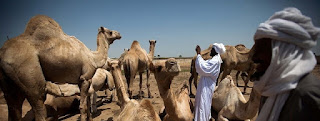Article from Chatham House, UK
Written by MOHAMED EL AASSAR
Senior Journalist at BBC Monitoring’s Middle East and North Africa team
Dated 29 July 2019
Gulf states are mapping Khartoum’s future
Fate of power sharing deal in Sudan rests in the hands of wealthy donors
Photo: Sudanese deputy head of the Transitional Military Council, General Mohamed Hamdan Dagalo
Since Omar al-Bashir, the Sudanese leader, was forced to step down in April by pro-democracy street protesters, the governing Transitional Military Council has received strong backing from the Gulf states of Saudi Arabia and the United Arab Emirates.
Bashir and Saudi Arabia have a long and tangled history. For many years, the two were sworn enemies. But since 2014, Saudi Arabia has co-opted Bashir to remove him from Iran’s sphere of influence. Money flowed in and Saudi lobbying helped remove United States sanctions on Sudan. Iranian cultural, medical and military facilities were closed and diplomats expelled.
In 2015, Sudanese troops joined the Saudi-led coalition fighting the Houthi rebels in Yemen.
Similarly, the UAE wanted to ‘turn’ Bashir from his Islamist roots, and thus deprive its long-term enemy the Muslim Brotherhood of a safe haven in Khartoum.
All this changed earlier this year. As the street protests began to threaten Bashir’s grip on power, the Saudis and Emiratis started to look to a post-Bashir world.
Despite the Gulf monarchies’ known aversion to Arab uprisings, Saudi and UAE media were uncharacteristically upbeat in their coverage of Bashir’s overthrow – in many cases even appearing to support the protest movement.
This contrasted with Gulf rival Qatar’s Al Jazeera, which depicted the crisis as a conflict between military and civilian rule, and warned of a ‘coup’ against Bashir.
This didn’t help the Sudanese president, however. A past master at playing Gulf rivals off against each other, this time he had suddenly lost his touch.
After Bashir
At the height of the protests he visited his long-time Qatari patron to ask for Doha’s money and backing. He returned empty-handed. For its part, the UAE reportedly refused to extend further support until he purged his administration of Islamists. Something he refused to do.
After the fall of Bashir, Saudi Arabia and the UAE announced a $3 billion aid package to meet Sudan’s most pressing needs. At about the same time, Sudanese media were gripped by the return of Major- General Taha Othman al-Hussein to Khartoum. Once Bashir’s chief of staff, he had fallen out with his former boss and turned up in Riyadh as a Saudi royal adviser.
He returned to Khartoum at the head of an Emirati delegation. It is widely believed that he was the architect of Sudan’s participation in the Yemen conflict, having overseen the Rapid Support Forces (RSF) as part of his earlier role at the presidency.
As well as playing a much-feared security enforcement role in Sudan, the RSF also provides the main component of the Sudanese forces fighting in the Saudi-led coalition against the Iran-backed Houthi rebels in Yemen.
The Sudanese are posted at Yemen’s volatile border with Saudi, have fought in battles for control of Yemen’s west coast and provide security in cities in the coalition-controlled south.
The Yemeni rebels call them ‘mercenaries’ and ‘Janjaweed’ – the latter a reference to the RSF’s role in laying waste to Darfur in the early 2000s.
The Sudanese media don’t like them much either. They too refer to the forces as Janjaweed and accuse them of terrorizing civilians and carrying out ‘barbaric and brutal assaults’ against peaceful protesters.
Their leader, Mohamed Hamdan Dagalo, who is also known as Hemeti, is loathed by the opposition. Facebook groups have branded him ‘a devil’ and the RSF the ‘Rapist Savage Forces’.
A former camel trader turned military leader, he was described by the influential pro-opposition website Dabanga as a man who has ‘never entered a military college, even for a single day, never trained or attended any military course, and never achieved any academic or any military awards’.
When Hemeti recently boasted about the large Sudanese contingent in the coalition in Yemen, another opposition website questioned why the lives of 30,000 Sudanese were being put at risk in a war in which Sudan has neither ‘a camel nor a mule at stake’. A column in the privately owned Sudanese newspaper Al-Jaridah said the Sudanese military ‘do not represent us and are not authorized to speak in our name when they say that Sudanese soldiers will remain in Yemen’.
Hemeti’s central role in the Transitional Military Council (TMC) and the violent dispersal of protests have not helped improve the military’s popularity. In April, videos circulated on social media depicted the Sudanese army ‘protecting’ the demonstrators outside military headquarters in Khartoum. Now the media make little reference to Sudan’s armed forces.
Saudi changes tack
As negotiations between the opposition and the military leaders stalled, the Saudis shifted tactics.
Their media prominently featured veteran Sudanese opposition figure Sadiq al-Mahdi, who was calling for compromise between the opposition and the military.
Saudi-owned, Dubai-based Al Arabiya TV tried to present itself as an objective observer. It gave equal air time to opposition and pro-TMC voices and regularly hosted representatives of the Sudanese Professionals Association, the group that had spearheaded the protests.
To their credit, Al Arabiya’s Sudanese reporters regularly reframe loaded questions by anchors and question TMC accusations against the protest movement in their live two-ways.
In July, the military and the opposition finally signed an agreement on a joint sovereign council that will rule during a transitional period.
Whether or not this compromise deal holds, Sudan’s future will continue to be heavily influenced by Gulf rivalries – backed by huge amounts of Gulf cash.
AUTHOR: Mohamed El Aassar is a Senior Journalist at BBC Monitoring’s Middle East and North Africa team




